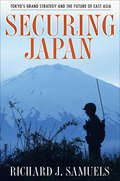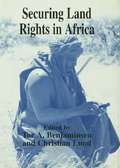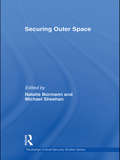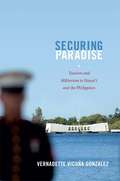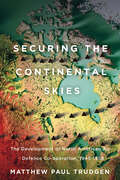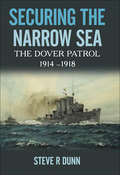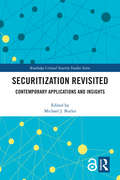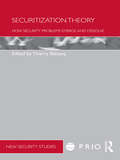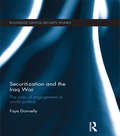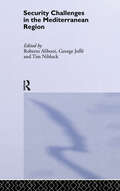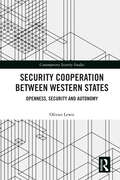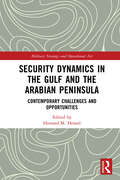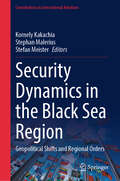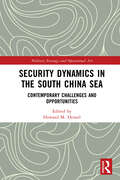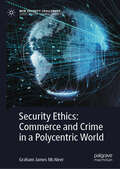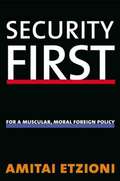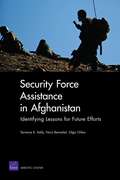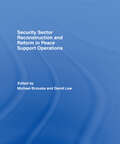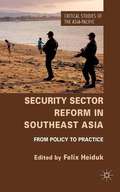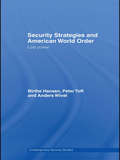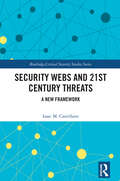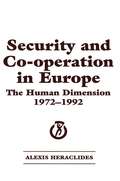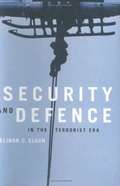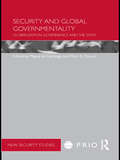- Table View
- List View
Securing Japan: Tokyo's Grand Strategy and the Future of East Asia (Cornell Studies in Security Affairs)
by Richard J. SamuelsFor the past sixty years, the U.S. government has assumed that Japan's security policies would reinforce American interests in Asia. The political and military profile of Asia is changing rapidly, however. Korea's nuclear program, China's rise, and the relative decline of U.S. power have commanded strategic review in Tokyo just as these matters have in Washington. What is the next step for Japan's security policy? Will confluence with U.S. interests—and the alliance—survive intact? Will the policy be transformed? Or will Japan become more autonomous?Richard J. Samuels demonstrates that over the last decade, a revisionist group of Japanese policymakers has consolidated power. The Koizumi government of the early 2000s took bold steps to position Japan's military to play a global security role. It left its successor, the Abe government, to further define and legitimate Japan's new grand strategy, a project well under way-and vigorously contested both at home and in the region. Securing Japan begins by tracing the history of Japan's grand strategy—from the Meiji rulers, who recognized the intimate connection between economic success and military advance, to the Konoye consensus that led to Japan's defeat in World War II and the postwar compact with the United States. Samuels shows how the ideological connections across these wars and agreements help explain today's debate. He then explores Japan's recent strategic choices, arguing that Japan will ultimately strike a balance between national strength and national autonomy, a position that will allow it to exist securely without being either too dependent on the United States or too vulnerable to threats from China. Samuels's insights into Japanese history, society, and politics have been honed over a distinguished career and enriched by interviews with policymakers and original archival research. Securing Japan is a definitive assessment of Japanese security policy and its implications for the future of East Asia.
Securing Land Rights in Africa
by Christian Lund Tor A. BenjaminsenThis collection of research papers from across the African continent illustrates the complex and ever-changing rules of the land tenure game, and how government legislation and reform (formalization) interact with local innovations (informalization) to form land tenure systems.
Securing Outer Space: International Relations Theory and the Politics of Space (Routledge Critical Security Studies)
by Natalie Bormann Michael SheehanThe challenges that space poses for political theory are profound. Yet until now, the exploration and utilization of space has generally reflected – but not challenged – the political patterns and impulses which characterized twentieth-century politics and International Relations. This edited volume analyses a number of controversial policies, and contentious strategies which have promoted space activities under the rubric of exploration and innovation, militarization and weaponization, colonization and commercialization. It places these policies and strategies in broader theoretical perspective in two key ways. Firstly, it engages in a reading of the discourses of space activities: exposing their meaning-producing practices; uncovering the narratives which convey certain space strategies as desirable, inevitable and seamless. Secondly, the essays suggest ways of understanding, and critically engaging with, the effects of particular space policies. The essays here seek to ‘bring back space’ into the realm of International Relations discourse, from which it has been largely removed, marginalized and silenced. The various chapters do this by highlighting how activities in outer space are always connected to earth-bound practices and performances of the every day. Securing Outer Space will be of great interest to students of space power, critical security studies and IR theory.
Securing Paradise: Tourism and Militarism in Hawai'i and the Philippines
by Gonzalez Vernadette VicuñaIn Securing Paradise, Vernadette Vicuña Gonzalez shows how tourism and militarism have functioned together in Hawaii and the Philippines, jointly empowering the United States to assert its geostrategic and economic interests in the Pacific. She does so by interpreting fiction, closely examining colonial and military construction projects, and delving into present-day tourist practices, spaces, and narratives. For instance, in both Hawaii and the Philippines, U. S. military modes of mobility, control, and surveillance enable scenic tourist byways. Past and present U. S. military posts, such as the Clark and Subic Bases and the Pearl Harbor complex, have been reincarnated as destinations for tourists interested in World War II. The history of the U. S. military is foundational to tourist itineraries and imaginations in such sites. At the same time, U. S. military dominance is reinforced by the logics and practices of mobility and consumption underlying modern tourism. Working in tandem, militarism and tourism produce gendered structures of feeling and formations of knowledge. These become routinized into everyday life in Hawaii and the Philippines, inculcating U. S. imperialism in the Pacific.
Securing the Continental Skies: The Development of North American Air Defence Co-operation, 1945–1958
by Matthew Paul TrudgenDuring the early years of the Cold War, Canada and the United States began to develop a peacetime defence relationship. Initial co-operation was limited to the construction of minor installations and the creation of joint plans. But in 1950 both countries began to develop an air defence system to protect North America from the Soviet threat.Securing the Continental Skies uses archival sources that have become available since the end of the Cold War to offer new insights into the development of the North American air defence system during the 1940s and 1950s. Matthew Trudgen analyzes the negotiations behind several recommendations from the Permanent Joint Board on Defence, three early-warning radar lines, and the North American Air Defence Command (NORAD). He argues that in Canada, air defence policy was shaped by different conceptions of the national interest among the Cabinet, the Department of External Affairs, the Royal Canadian Air Force, and the departments of Transport, Defence Production, and Northern Affairs and Natural Resources. In the United States, air defence policy reflected differing assessments of the importance of continental defence by the Truman and Eisenhower administrations. Ultimately North America’s air defences were the outcome of a variety of factors, including Canadian political considerations and emerging nationalism, the state of Canada’s electronics industry, the relationship between both countries’ air forces, and American nuclear strategy.Securing the Continental Skies challenges assumptions about Canadian foreign relations in the 1940s and 1950s and offers a new assessment of military co-operation between Canada and the United States.
Securing the Narrow Sea: The Dover Patrol, 1914–1918
by Steve R DunnThe Dover Patrol, which brought together an assortment of vessels ranging from the modern to the antique and included cruisers, monitors, destroyers, trawlers, drifters, yachts and airships, was commanded by a series of radical and polarizing personalities and increasingly manned by citizen volunteers. Between 1914 and 1918 the men of the Patrol sought to shut down German access to the Atlantic via the narrows of the English Channel, with the goal of preventing German bound trade going in and U-boats, commerce raiders and warships going out. Their story has rarely been told, but it was the longest, and probably the most arduous, continuous naval campaign of the war, demanding much sacrifice of ships and men. Using firsthand accounts of the participants, the book examines the wide-ranging exploits of the Dover Patrol from shore bombardment, barrage building and maintenance, antisubmarine work and escort duties to the protection of troops and supplies to the Western Front and ship-to-ship engagements with German forces. It also charts the infighting at the Admiralty which led to two changes of command and examines the personalities of the men involved. The author paints a vivid picture of a vital and little known part of the war at sea, bringing its exploits and challenges to life and culminating with the infamous Zeebrugge and Ostend raids. An important new book.
Securitization Revisited: Contemporary Applications and Insights (Routledge Critical Security Studies)
by Michael ButlerThis book seeks to interrogate how contemporary policy issues become ‘securitized’ and, furthermore, what the implications of this process are. A generation after the introduction of the concept of securitization to the security studies field, this book engages with how securitization and desecuritization ‘works’ within and across a wide range of security domains including terrorism and counter-terrorism, climate change, sexual and gender-based violence, inter-state and intra-state conflict, identity, and memory in various geographic and social contexts. Blending theory and application, the contributors to this volume – drawn from different disciplinary, ontological, and geographic ‘spaces’ – orient their investigations around three common analytical objectives: revealing deficiencies in and through application(s) of securitization; considering securitization through speech-acts and discourse as well as other mechanisms; and exposing latent orthodoxies embedded in securitization research. The volume demonstrates the dynamic and elastic quality of securitization and desecuritization as concepts that bear explanatory fruit when applied across a wide range of security issues, actors, and audiences. It also reveals the deficiencies in restricting securitization research to an overly narrow set of issues, actors, and mechanisms. This volume will be of great interest to scholars of critical security studies, international security, and International Relations.
Securitization Theory: How Security Problems Emerge and Dissolve (PRIO New Security Studies)
by Thierry BalzacqThis volume aims to provide a new framework for the analysis of securitization processes, increasing our understanding of how security issues emerge, evolve and dissolve. Securitisation theory has become one of the key components of security studies and IR courses in recent years, and this book represents the first attempt to provide an integrated and rigorous overview of securitization practices within a coherent framework. To do so, it organizes securitization around three core assumptions which make the theory applicable to empirical studies: the centrality of audience, the co-dependency of agency and context and the structuring force of the dispositif. These assumptions are then investigated through discourse analysis, process-tracing, ethnographic research, and content analysis and discussed in relation to extensive case studies. This innovative new book will be of much interest to students of securitisation and critical security studies, as well as IR theory and sociology. Thierry Balzacq is holder of the Tocqueville Chair on Security Policies and Professor at the University of Namur. He is Research Director at the University of Louvain and Associate Researcher at the Centre for European Studies at Sciences Po Paris.
Securitization and the Iraq War: The rules of engagement in world politics (Routledge Critical Security Studies)
by Faye DonnellyThis book critiques the conceptualization of security found in mainstream and critical theoretical debates, and applies this to the empirical case of the 2003 Iraq War. The Iraq War represents one of the most puzzling, complex, and controversial events in the post-Cold War era. The manner in which the Bush administration finally decided to hold Saddam Hussein accountable through military intervention provoked a worldwide outcry due to the narratives they constructed to justify the "pre-emptive use of force" and "enhanced interrogation techniques." Responding to constructivist and post-structuralist scholars' calls for a turn to discourse, and aligning its argument with critical security studies, particularly the Copenhagen School (CS), this book conceptualizes language as a pivotal mechanism of power. Adopting a Wittgensteinian approach, it moves away from thinking about the nexus between security and language from a single action, or speech act, to a series of actions or interactions. To illustrate this new approach, the author examines two cases in particular: the UN inspectors' finding that there was no credible evidence that Iraq possessed weapons of mass destruction (WMD) in early 2003 and the Abu Ghraib scandal in 2004. Both events show that the boundaries and relations between securitized rules and environments are not pre-given but produced in a particular language game. This book will be of much interest to students of critical security studies, US foreign policy, and IR in general.
Security Challenges in the Mediterranean Region
by George Joffé Tim Niblock Roberto AliboniContributions to this book question the concept of the clash of cultures. The challenge to the West does not lie in the monolith of Islam turning aggressively outward to Europe and the US, but in the rivalries between regimes ruling over societies divided by an imbalance in wealth and power.
Security Cooperation between Western States: Openness, Security and Autonomy (Contemporary Security Studies)
by Olivier LewisThis book examines security cooperation between Western states. Security cooperation occurs between Western (i.e. European and North American) states as a coping mechanism, as an imperfect substitute for integration. The book investigates the reasons for cooperation, what Aristotle called the ‘final cause’, as well as the material, formal, and efficient causes of cooperation. Such a causal explanation is based on a Critical Realist philosophy of social science. The book is also based on an embedded multiple-case study; the states studied are the United States, France, and Luxembourg. Within each state, the embedded subcases are three types of state security organizations: the armed forces, law enforcement, and intelligence agencies, which have rarely been compared in this way. Comparing different types of states and different types of state security organizations has allowed temporal, spatial, national, and functional variation in cooperation to be identified and theorized. The empirical evidence studied includes participant observations at the North Atlantic Treaty Organization and documents such as state policy documents, annual reports by organizations, reports by parliaments and non-governmental organizations, autobiographies, books by investigative journalists, and articles by newspapers and magazines. The book is also based on a score of elite interviews with ambassadors, diplomatic liaisons, ministerial advisors, foreign ministry officials, and military commanders. This book will be of much interest to students of security studies, intelligence studies, military studies and International Relations in general.
Security Dynamics in The Gulf and The Arabian Peninsula: Contemporary Challenges and Opportunities (Military Strategy and Operational Art)
by Howard M. HenselThis book focuses on security dynamics in the contemporary Gulf and Arabian Peninsula. It highlights the development of the Gulf and the Arabian Peninsula, the contemporary challenges and opportunities confronting the principal powers that are active in this important sub-region, and analyzes and evaluates their policy responses. The various perspectives of the chapters all suggest that the stability and security of the Gulf sub-region is now and will continue in the future to be of vital importance to the global community. The chapters that compose the volume are organized into three thematic sections. Part I, ‘Security Challenges and Power Configurations in the Gulf and the Arabian Peninsula: The Historical Context’, comprises three chapters. Part II, consisting of seven chapters, is entitled, ‘Contemporary Security Challenges and Opportunities in the Gulf and the Arabian Peninsula.’ Part III, ‘Contemporary National Interests, Objectives, and Strategies of the Major Powers in the Gulf and the Arabian Peninsula’, comprises five chapters. Finally, the volume ends with a concluding chapter. Unfortunately, the contemporary unstable, heterogeneous Gulf sub-region is fraught with extremely serious and often urgent challenges that threaten the sub-region’s security. This volume helps to illuminate the nature of the sub-regional environment and the contemporary challenges and opportunities that confront the various powers that are active in the Gulf. It also contributes to a greater understanding of the interests, contemporary objectives, and strategies of those powers as they formulate and implement policies in response to the challenges and opportunities that they confront. This book will be of much interest to students of security studies, Middle Eastern politics and International Relations.
Security Dynamics in the Black Sea Region: Geopolitical Shifts and Regional Orders (Contributions to International Relations)
by Kornely Kakachia Stephan Malerius Stefan MeisterThis book examines the geopolitical shifts triggered by Russia's military aggression against Ukraine from February 2022 onwards. This conflict has catalyzed unprecedented transformations in the Black Sea region's security landscape, reshaping the foundations of international relations. Presenting various case studies on key players such Russia, Ukraine, the USA, Turkey, the European Union, and NATO, the book presents a comprehensive analysis of the multifaceted impacts stemming from the conflict, focusing on three critical dimensions: military, economic, and human security. The contributions examine whether and how the conflict has not only magnified security challenges but also spurred resistance by Ukrainian forces and society. It also examines the impact of comprehensive economic sanctions and Western military and financial assistance to Ukraine on Russia's military capabilities and regional balance of power. The book sheds new light on the intricate interplay between state actors, multilateral institutions, and emerging regional orders. By dissecting the impact on governance models, rule of law, and human security, the book illuminates the far-reaching consequences of the conflict beyond military dynamics. With a keen focus on the emergent European security order, the book underscores the need for novel strategies to address the evolving security complexities in the Black Sea region. This book is a must-read for those seeking insights into the changing face of European security and the emergence of a new geopolitical order.
Security Dynamics in the South China Sea: Contemporary Challenges and Opportunities (Military Strategy and Operational Art)
by Howard M. HenselThis volume examines the South China Sea’s regional security dynamics, highlighting the challenges and opportunities for both littoral and non-littoral states.The South China Sea is a vital pathway for the great container ships and tankers, as well as for the naval vessels of today. Indeed, the security of the contemporary global economy is reliant more than ever upon the dependability of freedom of navigation through the waters of the South China Sea. This volume concentrates on the security of the South China Sea sub-region. It is designed to help illuminate the contemporary security dynamics within this important sub-region by highlighting its development, the contemporary challenges and opportunities confronting both the littoral states and the non-littoral powers that are active in the sub-region, and the policy responses of those states as they seek to defend and promote their national interests. This book is composed of 16 chapters and is organized into five thematic sections. Part I of the book is designed to set the historical context. Part II examines some of the contemporary challenges and opportunities that present themselves in the sub-region, while Part III focuses on Chinese policy in the South China Sea sub-region. Parts IV and Part V analyse and evaluate the contemporary policies of the various littoral and non-littoral powers that are active in the South China Sea sub-region. The collective analyses and assessments of the contemporary perceptions and policies of the various littoral and non-littoral powers active in the South China Sea in response to the traditional and non-traditional challenges within the sub-region that are examined in the chapters contained in Parts III, IV, and V, framed against the material presented in Parts I and II, provides the basis for observations concerning areas of conflicting and coinciding interests in the concluding chapter of the book.This book will be of interest to students of the South China Sea, maritime security, Asian politics, and international relations.
Security Ethics: Commerce and Crime in a Polycentric World (New Security Challenges)
by Graham James McAleerThis book explores criminal threat to commercial security and the problem of the ethical control of political and criminal risk alongside and in the absence of government. Theoretically, it links ethics to geopolitics and political economy. Security Ethics: Commerce and Crime in a Polycentric World builds from well-known thinkers, but not theorists typically found in books of applied ethics and security studies. Chapters include Francisco de Vitoria&’s account of just war applied to pirates; John Locke on dignity and the illegal trade in body parts; David Hume on community justice combatting cartels; Adam Smith on luxury and knockoffs; Bakunin and anarchist gunrunning; Johan Huizinga on play and crime; David Ross on corporate obligation in the face of partizan risk to hotel security; Carl Schmitt on geography and smuggling; Aurel Kolnai on privilege and corporate secrets; and David Petraeus, author of The US Army/Marine Corps Counterinsurgency Field Manual, respecting ecotage and commercial legitimacy.
Security First: For a Muscular, Moral Foreign Policy
by Amitai Etzioni"Rarely have more profound changes in American foreign policy been called for than today," begins Amitai Etzioni in the preface to this book. Yet Etzioni's concern is not to lay blame for past mistakes but to address the future: What can now be done to improve U. S. relations with the rest of the world? What should American policies be toward recently liberated countries such as Iraq and Afghanistan, or rogue states like North Korea and Iran? When should the United States undertake humanitarian intervention abroad? What must be done to protect America from nuclear terrorism? The author asserts that providing basic security must be the first priority in all foreign policy considerations, even ahead of efforts to democratize. He sets out essential guidelines for a foreign policy that makes sense in the real world, builds on moral principles, and creates the possibility of establishing positive relationships with Muslim nations and all others. Etzioni has considered the issues deeply and for many years. His conclusions fall into no neat categories--neither "liberal" nor "conservative"--for he is guided not by ideology but by empirical evidence and moral deliberation. His proposal rings with the sound of reason, and this important book belongs on the reading list of every concerned leader, policy maker, and voter in America.
Security Force Assistance in Afghanistan: Identifying Lessons for Future Efforts
by Nora Bensahel Olga Oliker Terrence K. KellySecurity force assistance (SFA) is a central pillar of the counterinsurgency campaign being waged by U.S. and coalition forces in Afghanistan. This monograph analyzes SFA efforts in Afghanistan over time, documents U.S. and international approaches to building the Afghan force from 2001 to 2009, and provides observations and recommendations that emerged from extensive fieldwork in Afghanistan in 2009 and their implications for the U.S. Army.
Security Sector Reconstruction and Reform in Peace Support Operations
by Michael Brzoska and David LawThis volume provides a framework for analyzing security sector reform under international tutelage.Following violent conflict and military interventions, international organizations or coalitions of countries increasingly engage in post-conflict reconstruction. Part of the international post-conflict agenda is thereconstruction orreform of th
Security Sector Reform in Southeast Asia
by Felix HeidukSuccessful reform of the security sector has been regarded as pivotal for a successful transition from authoritarianism to democracy by Western donors. A global cast of contributors examines SSR in a variety of policy fields in Southeast Asia, paying specific attention to the adaption of 'Western' reform concepts by local actors.
Security Sector Reform in Ukraine
by Olga Oliker Lynn E. Davis Keith Crane Andrew Radin James T. Quinlivan Celeste Ward Gventer Andriy Bega Bryan Frederick Hlavka Jacopo Bellasio Stephan B. Seabrook Susanne SondergaardThe Maidan Revolution in Ukraine created an opportunity for change and reforms in a system that had resisted them for 25 years. This report examines Ukraine’s security sector—assessing what different institutions need to do and where gaps exist—and offers recommendations for the reform of Ukraine’s security and defense institutions that meet Ukraine’s security needs and align with Euro-Atlantic standards and approaches.
Security Strategies and American World Order: Lost Power (Contemporary Security Studies)
by Anders Wivel Birthe Hansen Peter ToftThis book analyses security strategies in the American world order, systematically comparing Russian, Middle Eastern and European policies. The main finding is that the loss of relative power has decisive importance for the security strategies of states, but that particular strategies can only be explained when relative power is combined with ideology and the probability of military conflict. Research on the unipolar world order has focused largely on the general dynamics of the system and the actions of the American unipole. By contrast, this book focuses on states that lost out relatively as a consequence of unipolarity, and seeks to explain how this loss has affected their security strategies. Thus, in essence, the book tells ‘the other side of the story’ about the contemporary world order. In addition, it makes an important theoretical contribution by systematically coupling relative ideology and relative security with relative power and exploring their explanatory value. This book will be of great interest to students of international relations, security studies and foreign policy.
Security Webs and 21st Century Threats: A New Framework (Critical Security Series)
by Isaac M. CastellanoThis book introduces a new framework of Security Webs, which unifies the traditional state security approach with the human security approach and applies this framework to emerging security concerns in the 21st century.Security Webs offers a framework to examine security threats, responses, and second- and third-order consequences across a range of actors, and the structure to draw in existing findings, theories, and other frameworks into a universal and holistic approach to security. At its core, it clarifies the interconnected nature of security across time and space. Borrowing the concept of “food webs” from the field of ecology, which maps out how animals and plants gain energy and food, the Security Webs framework allows for an examination of the security of an actor, be it a nation-state, non-state actor, or an individual, where each actor gains strength and security but likewise is also threatened. The book profiles several of the emerging security threats and illustrates how the Security Webs framework can help us study these; these threats include climate change, weak state capacity, and political extremism, which all pose significant threats to states, non-state actors, and individuals alike. Bridging the divide between the traditionalist and the human security camps, the book embraces the complexity that not only is international security and offers a framework applicable to every actor but also, when applied, creates a clear picture of security threats and arrangements.This book will be of interest to students of security studies, human security, environmental security, and International Relations.
Security and Co-operation in Europe: The Human Dimension 1972-1992
by Alexis HeraclidesThe human dimension of the Conference on Security and Co-operation in Europe (CSCE) implies an alternative vision of security and co-operation in Europe, based on respect for human rights, democracy, the rule of law, minority rights and human contacts. Until recently the human dimension has been the main claim to perpetuity of the CSCE. It has been through the years the main point of controversy among its participating states, and has played an important role in the revolutionary events of 1989 which transformed Europe.
Security and Defence in the Terrorist Era
by Elinor C. SloanCanada's traditional approach to security - "the best defence is a good offence" - became even more entrenched following 9/11. Elinor Sloan challenges this notion, arguing that "defensive" military and civilian measures at home are just as important to Canada as "offensive" military activities abroad. Security and Defence in the Terrorist Era looks at the nature of the post-9/11 threat environment, U.S. security and defence policy since the Cold War ended, intelligence gathering, and changes in military personnel and equipment requirements for addressing threats overseas. While Sloan favours increasing Canadian military capabilities, she shows that they also need to be reorganized. She emphasizes the importance of development aid and diplomacy in helping to rebuild failed states abroad and further suggests that Canada participate in the US strategic missile defence system as a logical extension of NORAD, which will otherwise become irrelevant.Sloan concludes that Canada's military capabilities fall well short of what is necessary to guarantee security and that changes are necessary to regain credibility and influence with the US.
Security and Global Governmentality: Globalization, Governance and the State (PRIO New Security Studies)
by Miguel De LarrinagaThis book examines global governance through Foucaultian notions of governmentality and security, as well as the complex intersections between the two. The volume explores how Foucault's understanding of the general economy of power in modern society allows us to consider the connection of two broad possible dynamics: the global governmentalization of security and the securitization of global governance. If Foucault's work on governmentality and security has found resonance in IR scholarship in recent years it is in large part due to his understanding of how these forms of power must necessarily take into account the management of circulation that, in seeking to maximize ‘good’ versus ‘bad’ circulatory flows, brings into play and problematizes the 'inside'/'outside' upon which domestic and international spaces have been traditionally understood. Indeed, Foucault introduces a set of conceptual tools that can inform our analyses of globalization, global governance and security in ways that have been left largely unexplored in the discipline of IR. Miguel de Larrinaga is Assistant Professor at the University of Ottawa where he has been teaching since 2002. Marc G. Doucet is an Associate Professor in the Department of Political Science at Saint Mary’s University.
